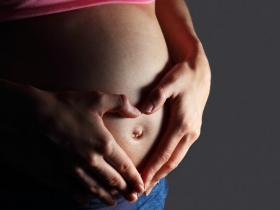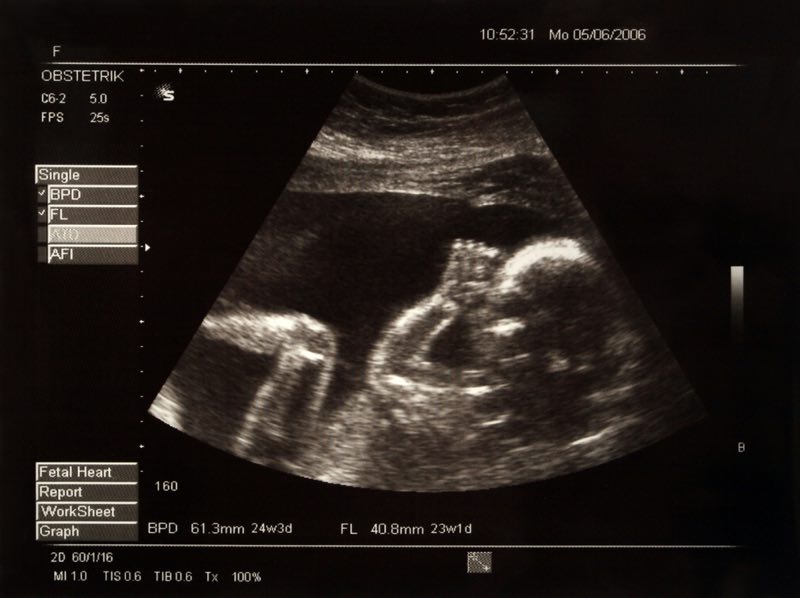Pregnancy week by week: 23 weeks
The twenty - third week of pregnancy is a period of many changes not only for the baby, but also for the expectant mother. The pregnancy is already clearly visibly, and it is during this time that weight gain occurs and rounding of the belly. The first uterine contractions, which are popularly called messengers, are also common. The baby also grows and gains weight. A big change for them is the development of hearing, thanks to which they can distinguish the mother's voice, to which they respond. What awaits pregnant women in the 23rd week of pregnancy?
Development of the baby in the 23rd week of pregnancy
In the twenty - third week of pregnancy, the baby measures an average of thirty centimetres in the womb and weighs about half a kilo. This week is a turning point, especially in terms of the risk of premature birth. From this time on, premature babies have up to an 80% chance of survival. This is despite the fact that during this period the baby does not have enough subcutaneous fat and individual organs and the lungs are still in development. On the contrary, the skin strengthens, becomes pigmented and the first teeth germs appear in the gums. Ideally, the baby should not be born until the fortieth week of pregnancy, but thanks to medical care, it still has good prospects at this time.
Throughout the pregnancy, the baby floats in saline amniotic fluid in the womb, which protects them, ensures optimal temperature and prevents infection. At week twenty - three, the unborn baby moves in the womb, turns and kicks. They begin to be aware of their mother's movement and voice. For this reason, some movements are more pleasant for them than others and they respond more actively to their mother's voice than to other sounds. Some research shows that babies who were communicated with by their mothers during pregnancy feel more at ease with their mother after birth. Experts recommend that the woman's partner also speak to the child. At this stage, the child can already distinguish different voices, their intonation and pitch. After birth, contact with a familiar voice will be more pleasant and more reassuring for them.
Expectant mother and physical changes
In the second trimester, usually around the twenty - third week, the woman's pregnancy begins to be visible. Thanks to the fact that the baby is growing and gains subcutaneous fat, the mother also rounds out and gains weight. Most women consider the second trimester to be the best period of pregnancy, but even during it, some expectant mothers may have various unpleasant pregnancy problems. These are usually bloating, heartburn, indigestion, excessive tiredness, back pain, swollen legs, varicose veins and haemorrhoids. During this period, some women observe the so-called messengers, painless contractions of the uterus, or hardening of the abdomen. An enlarging uterus can put pressure on the stomach and lungs, which can cause digestive problems, heartburn and shortness of breath.
Many of these problems can be prevented with a balanced diet, adequate rest and physical activity. It used to be thought that exercise was not suitable for pregnant women, and it is still applicable today in the case of high-risk pregnancies. Conversely, moderate exercise and walks can relieve many problems. If a woman is not sure to what extent she can undergo physical activity, she can always seek advice from her gynaecologist or midwife. Stretching, strengthening the pelvic floor muscles, elevating the legs and feet, and natural movement, such as walking, or wearing compression stockings will definitely not hurt. Strengthening of the pelvic floor is very important, because this holds the spine, affects the function of internal organs, prevents the leakage of urine during pregnancy and facilitates childbirth.
Problems and risks in the 23rd week of pregnancy
At this stage of pregnancy, the foetus develops very quickly and needs to acquire as many nutrients, vitamins and minerals from the mother's body. As a result, these mothers may lack these substances. Pregnant women often suffer mainly from a lack of iron, which the body needs to make red blood cells. At the same time, it is an effective prevention against fatigue, weakness and feelings of fainting. Iron can be supplied to the body from common foods such as nuts, green leafy vegetables, dried fruits and meat. Some women are deficient in iron even if they consume these foods regularly. In this case, after consultation with a gynaecologist, it is possible to start taking iron in the form of supplements.
In the twenty - third week of pregnancy, it is also necessary to carefully monitor the so - called cervix score, which determines the degree of risk of a preterm birth. The rate of cervical opening is determined on a scale of 0.1 to 2, and the higher the number, the greater the risk of a preterm birth. At this stage of pregnancy, the value should be zero. If this is not the case, it is up to the gynaecologist to decide how to proceed. There are several options. The doctor can leave the woman with a high-risk pregnancy at home, hospitalise her or perform a so - called cervical cerclage. This is a relatively routine procedure in which the cervix is tightened with a suture. It is then removed a few weeks before delivery.
Some problems and risks cannot be completely eliminated, but many of them can be successfully prevented. A pregnant woman should have a good mental state and physical condition. A healthy lifestyle, a balanced diet and the right ratio of physical activity and rest are important. At this stage, women can easily include mild exercise into their schedule, ideally yoga or exercises specifically for pregnant women, an active social and cultural life, meditation and other activities and hobbies that satisfy and bring her joy.
This article is translated from Czech original to English language by Bobby Pacewicz.







